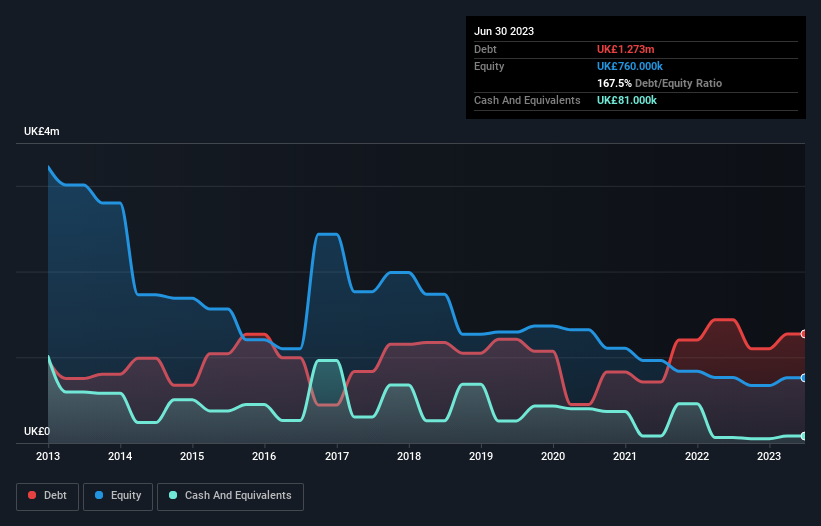- United Kingdom
- /
- Professional Services
- /
- AIM:NBB
Does Norman Broadbent (LON:NBB) Have A Healthy Balance Sheet?

Some say volatility, rather than debt, is the best way to think about risk as an investor, but Warren Buffett famously said that 'Volatility is far from synonymous with risk.' It's only natural to consider a company's balance sheet when you examine how risky it is, since debt is often involved when a business collapses. We can see that Norman Broadbent plc (LON:NBB) does use debt in its business. But is this debt a concern to shareholders?
What Risk Does Debt Bring?
Generally speaking, debt only becomes a real problem when a company can't easily pay it off, either by raising capital or with its own cash flow. Ultimately, if the company can't fulfill its legal obligations to repay debt, shareholders could walk away with nothing. However, a more frequent (but still costly) occurrence is where a company must issue shares at bargain-basement prices, permanently diluting shareholders, just to shore up its balance sheet. Of course, the upside of debt is that it often represents cheap capital, especially when it replaces dilution in a company with the ability to reinvest at high rates of return. When we examine debt levels, we first consider both cash and debt levels, together.
Check out our latest analysis for Norman Broadbent
What Is Norman Broadbent's Debt?
The image below, which you can click on for greater detail, shows that Norman Broadbent had debt of UK£1.27m at the end of June 2023, a reduction from UK£1.44m over a year. However, it does have UK£81.0k in cash offsetting this, leading to net debt of about UK£1.19m.

How Strong Is Norman Broadbent's Balance Sheet?
We can see from the most recent balance sheet that Norman Broadbent had liabilities of UK£3.99m falling due within a year, and liabilities of UK£142.0k due beyond that. Offsetting this, it had UK£81.0k in cash and UK£3.14m in receivables that were due within 12 months. So its liabilities total UK£904.0k more than the combination of its cash and short-term receivables.
While this might seem like a lot, it is not so bad since Norman Broadbent has a market capitalization of UK£3.86m, and so it could probably strengthen its balance sheet by raising capital if it needed to. However, it is still worthwhile taking a close look at its ability to pay off debt. The balance sheet is clearly the area to focus on when you are analysing debt. But it is Norman Broadbent's earnings that will influence how the balance sheet holds up in the future. So when considering debt, it's definitely worth looking at the earnings trend. Click here for an interactive snapshot.
In the last year Norman Broadbent wasn't profitable at an EBIT level, but managed to grow its revenue by 46%, to UK£11m. Shareholders probably have their fingers crossed that it can grow its way to profits.
Caveat Emptor
Even though Norman Broadbent managed to grow its top line quite deftly, the cold hard truth is that it is losing money on the EBIT line. Indeed, it lost UK£134k at the EBIT level. When we look at that and recall the liabilities on its balance sheet, relative to cash, it seems unwise to us for the company to have any debt. So we think its balance sheet is a little strained, though not beyond repair. We would feel better if it turned its trailing twelve month loss of UK£258k into a profit. In the meantime, we consider the stock very risky. The balance sheet is clearly the area to focus on when you are analysing debt. But ultimately, every company can contain risks that exist outside of the balance sheet. We've identified 1 warning sign with Norman Broadbent , and understanding them should be part of your investment process.
Of course, if you're the type of investor who prefers buying stocks without the burden of debt, then don't hesitate to discover our exclusive list of net cash growth stocks, today.
Valuation is complex, but we're here to simplify it.
Discover if Norman Broadbent might be undervalued or overvalued with our detailed analysis, featuring fair value estimates, potential risks, dividends, insider trades, and its financial condition.
Access Free AnalysisHave feedback on this article? Concerned about the content? Get in touch with us directly. Alternatively, email editorial-team (at) simplywallst.com.
This article by Simply Wall St is general in nature. We provide commentary based on historical data and analyst forecasts only using an unbiased methodology and our articles are not intended to be financial advice. It does not constitute a recommendation to buy or sell any stock, and does not take account of your objectives, or your financial situation. We aim to bring you long-term focused analysis driven by fundamental data. Note that our analysis may not factor in the latest price-sensitive company announcements or qualitative material. Simply Wall St has no position in any stocks mentioned.
About AIM:NBB
Norman Broadbent
Provides professional services in the United Kingdom and internationally.
Good value with adequate balance sheet.


